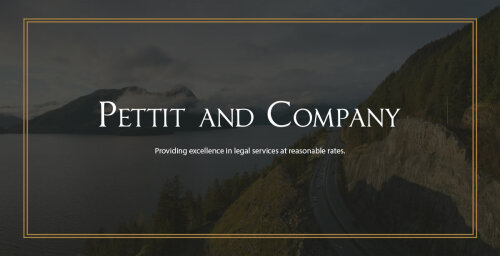Best Toxic Mold Lawyers in North Vancouver
Share your needs with us, get contacted by law firms.
Free. Takes 2 min.
List of the best lawyers in North Vancouver, Canada
About Toxic Mold Law in North Vancouver, Canada
North Vancouver, Canada, like many other areas, faces issues related to toxic mold in residential and commercial properties. Toxic mold can cause serious health problems and property damage, making it crucial for individuals to understand their legal rights and options in dealing with such situations.
Why You May Need a Lawyer
You may need a lawyer if you suspect toxic mold in your property and are facing challenges in getting it remediated or seeking compensation for any damages or health issues caused by the mold. A lawyer can help you navigate the complex legal processes, understand your rights, and advocate on your behalf to ensure a fair resolution.
Local Laws Overview
In North Vancouver, Canada, laws related to toxic mold typically fall under landlord-tenant regulations, property maintenance codes, and environmental health regulations. It is essential to be familiar with these laws to protect your rights and take appropriate legal action if needed.
Frequently Asked Questions
1. What are the common health issues associated with toxic mold exposure?
Exposure to toxic mold can cause respiratory problems, allergic reactions, skin irritation, and other health issues.
2. Who is responsible for addressing toxic mold in a rental property?
Landlords are typically responsible for addressing mold issues in rental properties and ensuring a safe and healthy living environment for tenants.
3. How can I prove that toxic mold is present in my property?
You may need to hire a professional mold inspector to conduct tests and provide evidence of mold contamination.
4. Can I sue my landlord for damages caused by toxic mold?
Yes, you may have legal grounds to sue your landlord for damages resulting from toxic mold exposure, such as medical expenses, property damage, and relocation costs.
5. What should I do if I suspect toxic mold in my property?
You should notify your landlord or property manager immediately, document the mold, and seek legal advice to protect your rights.
6. Are there time limits for filing a lawsuit related to toxic mold exposure?
Yes, there are statutes of limitations that limit the time within which you can file a lawsuit for toxic mold exposure. It is crucial to act promptly to preserve your legal rights.
7. How can a lawyer help me with a toxic mold case?
A lawyer can assess your case, advise you on your legal options, negotiate with the other parties involved, and represent you in court if necessary to seek compensation for damages.
8. What factors determine liability in a toxic mold case?
Liability in a toxic mold case may depend on factors such as the extent of the mold contamination, the cause of the mold growth, the landlord's awareness of the issue, and the steps taken to remediate the mold.
9. Are there government agencies that deal with toxic mold issues in North Vancouver?
Yes, agencies like the local health department and environmental protection agency may provide resources and guidance on handling toxic mold issues.
10. How much does it cost to hire a lawyer for a toxic mold case?
The cost of hiring a lawyer for a toxic mold case can vary depending on the complexity of the case, the lawyer's experience, and the fee structure agreed upon. Some lawyers may offer free consultations or work on a contingency fee basis.
Additional Resources
For more information on toxic mold and legal assistance in North Vancouver, Canada, you can contact the following resources:
- North Vancouver Health Department - Canadian Bar Association - Environmental Protection Agency
Next Steps
If you believe you have a toxic mold issue and need legal assistance, it is important to consult with a lawyer experienced in handling such cases. Take prompt action to protect your health and rights, gather evidence, document the damage, and seek legal advice to explore your options for resolving the issue effectively.
Lawzana helps you find the best lawyers and law firms in North Vancouver through a curated and pre-screened list of qualified legal professionals. Our platform offers rankings and detailed profiles of attorneys and law firms, allowing you to compare based on practice areas, including Toxic Mold, experience, and client feedback.
Each profile includes a description of the firm's areas of practice, client reviews, team members and partners, year of establishment, spoken languages, office locations, contact information, social media presence, and any published articles or resources. Most firms on our platform speak English and are experienced in both local and international legal matters.
Get a quote from top-rated law firms in North Vancouver, Canada — quickly, securely, and without unnecessary hassle.
Disclaimer:
The information provided on this page is for general informational purposes only and does not constitute legal advice. While we strive to ensure the accuracy and relevance of the content, legal information may change over time, and interpretations of the law can vary. You should always consult with a qualified legal professional for advice specific to your situation.
We disclaim all liability for actions taken or not taken based on the content of this page. If you believe any information is incorrect or outdated, please contact us, and we will review and update it where appropriate.








